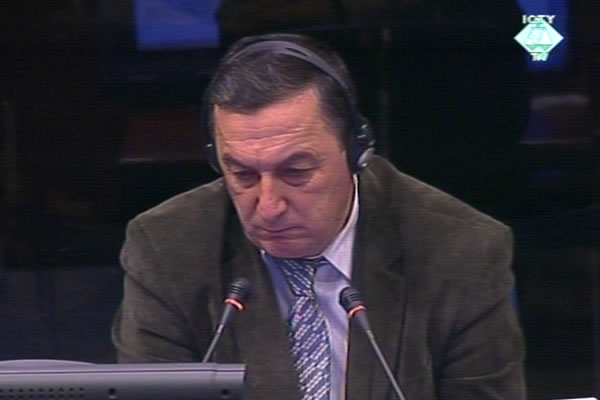Home
CHAOS, GOSSIP AND POSITIVE DISCRIMINATION IN HADZICI
In the cross-examination of Tihomir Glavas, former police chief in the Sarajevo municipalities of Hadzici and Ilidza, Radovan Karadzic tried to prove that there was no coordination between the local and central leadership, and that any claims about the collusion between the local bodies and the paramilitaries was nothing but ‘gossip’. The compulsory work service that the non-Serbs had to do was a ‘positive, not negative discrimination’, Karadzic suggests
 Tihomir Glavas, witness at the Radovan Karadzic trial
Tihomir Glavas, witness at the Radovan Karadzic trial In his cross-examination of Tihomir Glavas, former police chief in the Sarajevo municipalities of Hadzici and Ilidza, Radovan Karadzic tried to prove that there was no coordination between the local and central levels of government in Republika Srpska.
Karadzic quoted from the prosecution’s proofing notes in which Glavas said that the SDS ‘before the war had an excellent organizational structure, where everything functioned as clockwork, including the distribution of weapons’. After the conflict broke out, things ‘became chaotic and the local leadership and people were left to their own devices’. According to Glavas, the ‘people, citizens and the Repair and Maintenance Facility’ played the main role in the defense of Hadzici, not the SDS’.
Karadzic then tried to prove there were no links between the paramilitary units that committed crimes and the local army, police and civilian authorities, i.e. crisis staffs. Any claims that they acted in collusion are nothing but ‘gossip’, Karadzic suggested. Glavas confirmed that the crisis staffs didn’t tolerate ‘unlawful treatment’ of ‘detainees’ by paramilitary groups. The prosecutor revisited the issue in the re-examination by reminding the witness that he had described in his statement to the OTP investigators the abuse of prisoners in a make-shift prison in the sports center in Hadzici. The detention facility was established and controlled by the local crisis staff. Glavas replied that he has ‘no intention of contesting’ his own statement to the prosecution. ‘The municipal, police and military authorities didn’t issue instructions to torture’, Glavas explained.
Karadzic also claimed that the Muslims ‘left Hadzici of their own free will’. Those who remained there had to do compulsory work service, he said. ‘Most of the people preferred to do compulsory work service to serving in the army because they could get food and a small war salary’, he explained. The compulsory work service is often interpreted as ‘negative discrimination’, Karadzic said, but in this case it was ‘positive discrimination’. The witness confirmed it.
As he showed various documents to the witness, Karadzic tried to prove that the ‘Muslim side’ started establishing crisis staffs, distributing weapons, persecuting people first, while Serbs ‘were not skilled’. The presiding judge asked Karadzic to explain the relevance of that line of questioning. The accused readily replied that ‘the state, in the form of my person, stands accused of being responsible for some events’ and that he wanted to prove that Serbs didn’t commit crimes, that the authorities in fact prevented crimes and that the actions pursued by the Muslim side affected ‘the mindset, fear, insecurity, panic and revenge’.
Today, the public was given the reasoning behind the Trial Chamber’s oral decision to partially grant Karadzic’s motion for a temporary suspension of his trial because of delayed disclosure of evidence by the prosecution. Instead of a three-month suspension Karadzic asked for, the Trial Chamber ordered a six-week break in the trial, from 21 March to 5 May 2011.
Linked Reports
- Case : Karadzic
- 2011-02-15 KARADZIC – VICTIM OF DOUBLE CONSPIRACY
- 2011-02-14 CRISIS STAFFS IN ‘ROUGH AND HARD TIMES’
- 2011-02-14 EARLY NIGHTFALL IN SARAJEVO
- 2011-02-17 SURVIVOR OF BUS MASSACRE GIVES EVIDENCE
- 2011-02-22 PROFESSOR ZECEVIC MOVES FROM DOCK TO WITNESS STAND
- 2011-02-23 KARADZIC, ZECEVIC AND THE LAWS OF PHYSICS
